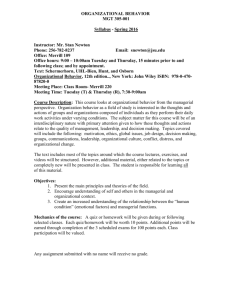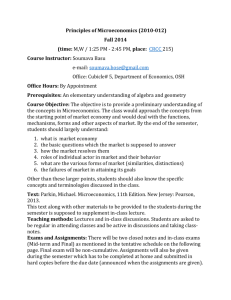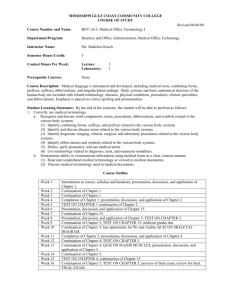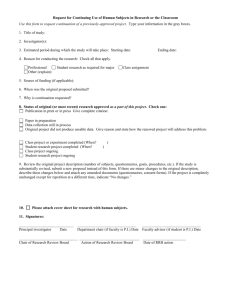ORGANIZATIONAL BEHAVIOR
advertisement
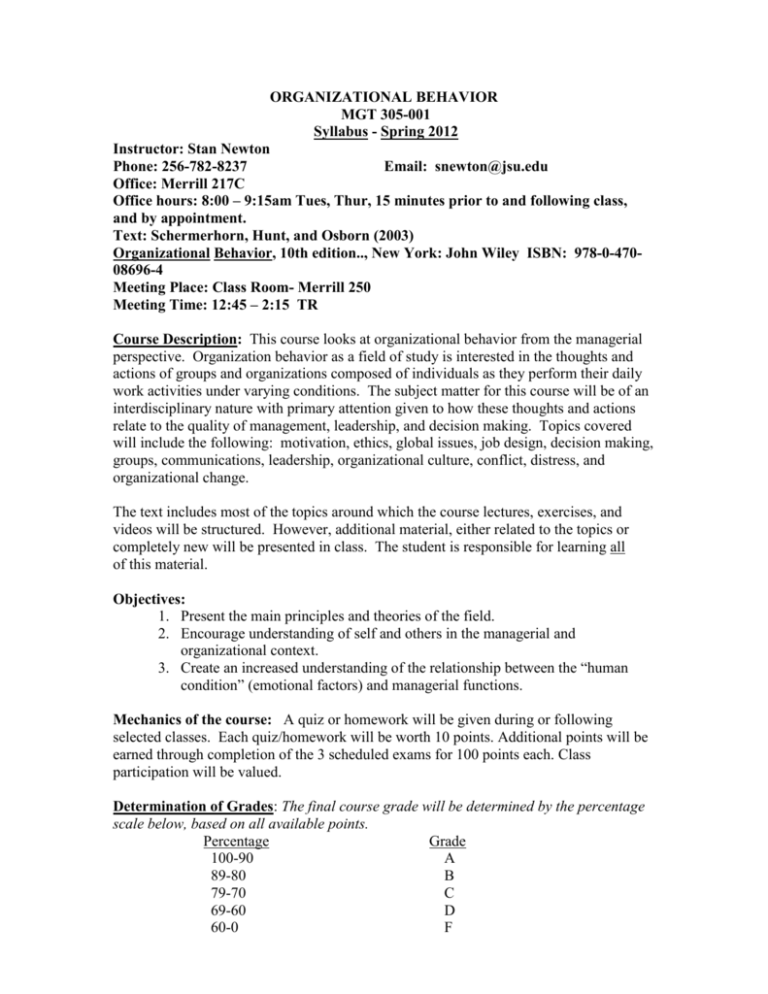
ORGANIZATIONAL BEHAVIOR MGT 305-001 Syllabus - Spring 2012 Instructor: Stan Newton Phone: 256-782-8237 Email: snewton@jsu.edu Office: Merrill 217C Office hours: 8:00 – 9:15am Tues, Thur, 15 minutes prior to and following class, and by appointment. Text: Schermerhorn, Hunt, and Osborn (2003) Organizational Behavior, 10th edition.., New York: John Wiley ISBN: 978-0-47008696-4 Meeting Place: Class Room- Merrill 250 Meeting Time: 12:45 – 2:15 TR Course Description: This course looks at organizational behavior from the managerial perspective. Organization behavior as a field of study is interested in the thoughts and actions of groups and organizations composed of individuals as they perform their daily work activities under varying conditions. The subject matter for this course will be of an interdisciplinary nature with primary attention given to how these thoughts and actions relate to the quality of management, leadership, and decision making. Topics covered will include the following: motivation, ethics, global issues, job design, decision making, groups, communications, leadership, organizational culture, conflict, distress, and organizational change. The text includes most of the topics around which the course lectures, exercises, and videos will be structured. However, additional material, either related to the topics or completely new will be presented in class. The student is responsible for learning all of this material. Objectives: 1. Present the main principles and theories of the field. 2. Encourage understanding of self and others in the managerial and organizational context. 3. Create an increased understanding of the relationship between the “human condition” (emotional factors) and managerial functions. Mechanics of the course: A quiz or homework will be given during or following selected classes. Each quiz/homework will be worth 10 points. Additional points will be earned through completion of the 3 scheduled exams for 100 points each. Class participation will be valued. Determination of Grades: The final course grade will be determined by the percentage scale below, based on all available points. Percentage Grade 100-90 A 89-80 B 79-70 C 69-60 D 60-0 F Make-ups for the 3 scheduled exams will be given provided the excuse is acceptable to me. Outside of unavoidable circumstances, advanced notice is considered mandatory. No make-ups will be given for the class quizzes or homework; however, the 2 lowest grades will be dropped from consideration. Email Communication: When emailing your instructor, be sure to include your name, course title and section. Untitled and unnamed emails will be filtered out and not opened. Any assignment submitted by email must have your name on the email and the assignment. Check your JSU email account regularly as this is the method your instructor will use to notify you of changes, progress reports, etc. Academic Honesty: Cheating and/or plagiarism are serious offenses and will be punished to the fullest extent granted by University policy. No grade will be given for any assignment turned in unsigned. Please Mr. Newton’s Web-site for the CCBA Student Code. Attendance: Students are responsible for their own attendance. However please note that some material not in the text will be presented in class. If you do not consistently attend, past experience shows you can expect a grade of “C” or less. You must be on time to be counted as present or to receive returned assignments. Classroom Behavior: The time spent in the classroom is time paid for by you, your parents, etc. Be respectful of your fellow students who have also paid for this time. Interruptive talking, cell phone use, leaving and returning to the classroom, sleeping on one’s desk, or eating is not allowed during class. Disruptive students and/or students who retard the learning process will be asked to leave the classroom. Persistent problems students will be dealt with according to university policies. General Instructions: It is critical in business and particularly so in management, that businesspersons pay attention to detail, follow instructions, and be professional. In order to encourage the development of such behavior, any lack of professionalism or deviation from instructions, written or verbal, may generate a penalty. Disability Accommodation Statement: Any individual who qualifies for reasonable accommodations under the Americans with Disabilities Act of Section 504 of the Rehabilitation Act of 1973 should contact the instructor immediately. ***Tentative Schedule of Assignments*** Thur-Jan. 12 Chapter 1, Introduction to Organizational Behavior Tues-Jan. 17 Chapter 2, Values, Personality, and Individual Differences Thur-Jan. 19 Chapter 3, Emotions, Attitudes, and Job Satisfaction Tues-Jan. 24 Chapter 4, Perception, Attribution, and Learning Thur-Jan. 26 Continuation Chapter 4 Tues-Jan. 31 Chapter 5, Motivation Theories Thur-Feb 2 Continuation Chapter 5 Tues-Feb. 7 Chapter 6, Motivation and Job Design Thur-Feb. 9 *** Exam #1; covering Chapters 1, 2, 3, 4, 5, 6 and all assignments/class covered material. Tues-Feb.14 Chapter 7, Rewards and Performance Management Thur-Feb. 16 Continuation Chapter 7 Tues-Feb. 21 Chapter 8, How Groups Work Thur-Feb. 23 Chapter 9, Team Work and Team Performance Tues-Feb. 28 Chapter 10, Power and Politics Thur-Mar. 1 Chapter 11, Leadership Theories Tues-Mar. 6 Continuation Chapter 11 Thur-Mar. 8 Chapter 12, Emerging Leadership Perspectives Tues-Mar. 13 ***Exam # 2, covering chapters 7, 8, 9, 10, 11, 12, and all assignments/class covered material. Thur-Mar. 15 Chapter 13, Decision Making Tues-Mar 20 Continuation Chapter 13 Thur-Mar.22 Chapter 14, Communication Mar. 26 – Mar.30 SPRING BREAK Tues-Apr. 3 Continuation Chapter 14 Thur-Apr. 5 Chapter 15, Conflict and Negotiation Tues-Apr 10 Continuation Chapter 15 Thur-Apr. 12 Chapter 16, Organizational Culture and Development Tues-Apr. 17 Chapter 17, Organizational Goals and Structures Thur-Apr. 19 Chapter 18, Strategic Capabilities and Design (LAST CLASS) Tues-Apr. 24 ***Final Exam; 10:30am - 12:30pm. Covering chapters 13, 14, 15, 16, 17, 18, and all assignments/class covered material. Students arriving after other students have completed the exam and left the room will not be allowed to take the test; and, will receive an “Incomplete” for the course.
